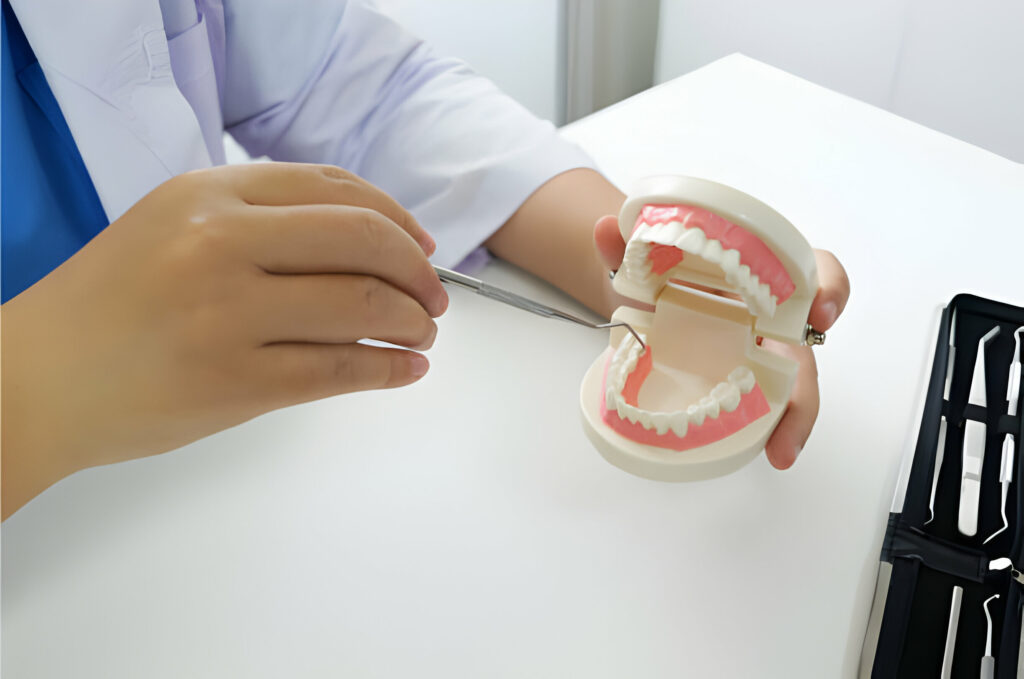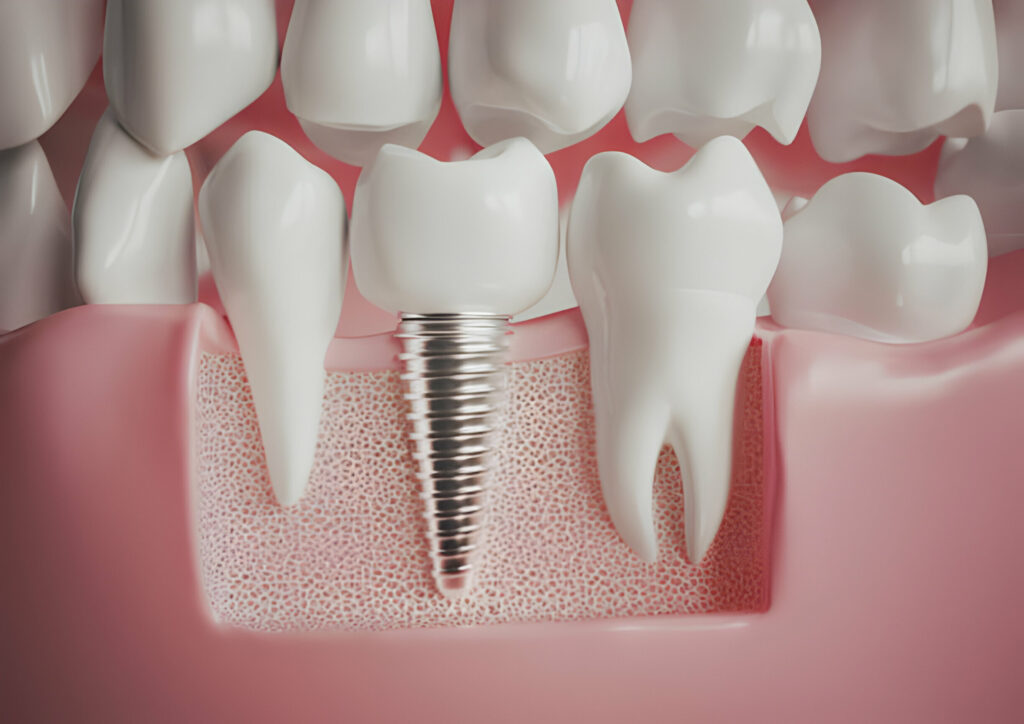Summary:
Is your missing tooth restricting your functionality and ruining your aesthetic smile? Relax because you are not the only one with a missing tooth.

There could be many reasons for tooth loss, such as cavities, tooth decay, and dental trauma. It can impact your tooth’s functionality and your ability to smile. Fortunately, you can have dental implants in New Albany to restore and enhance oral functions.
In this blog, we shall discuss topics like:
- What Is The Purpose Of Dental Implants?
- Types Of Dental Implants
- The Process Of Dental Implants
- The Versatility Of Dental Implants
Continue reading to learn everything about dental implants in the following sections:
What Is The Purpose Of Dental Implants?
Many people do not take oral hygiene seriously, which results in toothache, tooth decay, gum disease, plaque buildup, and eventually tooth loss. Losing a tooth can weaken your oral function and cause gums to recede. Stats suggest that around 120 million in the US have at least one missing tooth, while 36 million don’t have any teeth left.
You can use Rowan dental implants to address tooth loss, which has functional and cosmetic benefits. They consist of titanium posts implanted into the jawbone, providing a stable base for artificial teeth. By resembling natural teeth, implants restore chewing ability, maintain jawbone health, and enhance oral health and confidence.
Types Of Dental Implants
Dental implants from Dental Fixing are a popular and effective way to replace missing screws in teeth and restore oral function and aesthetics. There are several types of dental implants, each designed to suit different needs and conditions:
Endosteal Implants
These are the most common types of dental implants, which are surgically implanted directly into the jawbone. Endosteal implants are typically made from titanium and provide a strong foundation for artificial teeth with screws, such as crowns or bridges.
Subperiosteal Implants
Unlike endosteal, subperiosteal implants are placed on top of the jawbone but beneath the gum tissue. Dentists in New Albany, MS, use them when the patient does not have enough healthy jawbones to support traditional implants. Subperiosteal appliances are custom-made and rest on a metal framework attached to the jawbone.
All-on-4 Implants
This novel procedure uses only four implants in the jawbone to support a complete arch of teeth. Dentists frequently prescribe All-on-4 for patients who have undergone considerable bone loss or who want a faster and less expensive alternative than standard false teeth.
Zygomatic Implants
Dentists use Zygomatic implants in cases where there is insufficient bone in the upper jaw to support traditional appliances. Instead of anchoring into the jawbone, dentists place zygomatic into the cheekbone (zygomatic bone). This technique provides a stable foundation for the implantation of dental prosthetics without bone grafting.
Mini Implants
Mini implants are smaller in diameter than traditional false teeth, and dentists often use them in cases with limited space or bone density. They can be a suitable option for securing dentures in place and require less invasive surgery compared to standard implant teeth.
Single Tooth Implants
As the name suggests, dentists use single-tooth implants to replace missing teeth. They consist of a titanium implant, an abutment, and a dental crown, mimicking the structure of a natural tooth.
The Process Of Dental Implants
Dental implants are dependable for individuals seeking to replace missing teeth, providing functional and aesthetic benefits. The journey of obtaining teeth implants involves several crucial steps:
Stage 1 – Initial Assessment
Your dentist will commence the process by conducting a comprehensive examination. This initial consultation involves an assessment of the patient’s oral health, discussing available treatment options, and developing a personalized treatment plan tailored to the individual’s specific needs and desires.
Stage 2 – Preparatory Phase
If necessary, your dentist will extract any remaining damaged or decayed teeth before the implant placement. Additionally, they might recommend procedures like bone grafting or sinus augmentation to ensure sufficient bone support for the implants.
Stage 3 – Implant Placement Surgery
The next stage entails the surgical placement of the implant fixture into the jawbone. This surgical procedure is typically performed under local anesthesia to ensure patient comfort. The implant fixture, typically crafted from biocompatible titanium, mimics the function of a natural tooth root, providing a stable foundation for the replacement tooth.

Stage 4 – Healing and Osseointegration
Following the implant placement, you must go through a healing period for osseointegration. Osseointegration is the process wherein the implant fuses with the surrounding bone, resulting in a strong and secure foundation for the prosthetic tooth. This healing phase generally spans several months.
Stage 5 – Abutment Attachment
After osseointegration is complete, an abutment is affixed to the implant fixture. The abutment protrudes above the gum line and is a connecting point for the final prosthetic tooth or crown.
Stage 6 – Prosthetic Placement
The final step involves fabricating and placing the prosthetic tooth or crown onto the abutment. The dentist will design prosthetic teeth meticulously to match the shape, size, and color of the surrounding natural teeth, ensuring a seamless and natural-looking result.
Stage 7 – Follow-Up Care and Maintenance
After the completion of the implant procedure, regular follow-up appointments with the dentist are crucial. These visits are essential for monitoring the health and stability of the implant and providing guidance on proper oral hygiene practices and maintenance.
The Versatility Of Dental Implants
Dental implants have become a cornerstone of modern dentistry, offering diverse solutions for various dental challenges. Below are some critical applications of dental implants:
Single Tooth Replacement
Dentists typically use dental implants to replace missing teeth without affecting adjacent teeth. An implant-supported crown closely mimics the natural tooth’s appearance and function.
Multiple Teeth Replacement
Implants can support dental bridges in cases where several adjacent teeth are missing. Unlike traditional bridges, which rely on neighboring teeth for support, implant-supported bridges offer greater stability and help prevent bone loss in the jaw.

Full Arch Replacement
Implant-supported dentures are a secure and pleasant alternative to standard removable dentures for those who have lost all of their teeth in one arch. These permanent prostheses improve chewing efficiency, voice clarity, and general confidence.
Implant-Supported Overdentures
In situations where some natural teeth remain, overdentures supported by implants can be an effective solution. The appliance provides stability and retention for the denture, improving its functionality and reducing bone resorption.
Jaw Reconstruction
Dental implants are instrumental in jaw reconstruction procedures following trauma or congenital disabilities. They anchor prosthetic devices, restoring facial symmetry and oral function.
Denture Stabilization
Patients experiencing discomfort and instability with conventional dentures can benefit from implant-supported solutions. Patients experience improved comfort, enhanced bite force, and reduced slippage by anchoring the dentures to implants.
Takeaway
- Tooth loss is common, and around 120 million individuals in the US have a missing tooth, which impacts both function and appearance.
- Dental implants provide stable bases for artificial teeth, restoring chewing ability and confidence.
- The implant process involves assessment, surgery, healing, and prosthetic placement.
- Implants offer versatile solutions, from single tooth replacements to full arch restorations.
- Don’t say confused about dental implants anymore! Visit our experts at Rowan Family Dentistry today!

